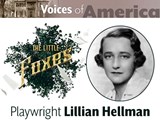By Brian Robin
Lillian Hellman—Renaissance Woman and Hell-Raiser
Lillian Hellman was the living embodiment of the first half of her last name. She was a hell-raiser in the tradition of her literary contemporaries—Ernest Hemingway, F. Scott Fitzgerald, John Steinbeck, Dorothy Parker, William Faulkner, and her lover for many years, Dashiell Hammett.
Hellman raised hell in other ways, meaningful and evergreen ways. She stopped drinking, smoking and carousing long enough to write plays challenging the status quo, systemic injustice and the abuse of power and greed. Plays like The Little Foxes, that not only proved commercial successes, but put Hellman in the front row of 20th century American dramatists. She became the first woman to break into that elite group of dramatists.
The Little Foxes, Hellman’s most successful and favorite play, runs Jan. 29-Feb. 26 on the Segerstrom Stage. Set in 1900 Alabama, it’s the 20th century’s half of SCR’s Voices of America. The centerpiece to SCR’s season, The Little Foxes alternates performances with Appropriate by Branden Jacobs-Jenkins. Each play will run four times a week with overlapping casts and the same set modified for each production.
Setting The Little Foxes in the South is understandable when you consider Hellman was born in New Orleans in 1905 and grew up with eclectic and grasping relatives. It’s not a stretch to see those relatives making barely disguised appearances as the Giddenses and Hubbards in The Little Foxes.
After dropping out of Columbia and New York University, marrying and divorcing her husband, Hellman migrated to Hollywood in the early 1930s, where she started as a reader for MGM. She organized her fellow readers into a union, where she met Hammett, the celebrated author of Red Harvest and The Maltese Falcon. The two would enjoy and endure a close, but tempestuous relationship until Hammett’s death in 1961.
Hammett was patronizing, a womanizer and a hard-drinker. But he provided Hellman the impetus to write. Hellman followed his lead, breaking out with The Children’s Hour (1934). That play, based on a 19th century Scottish tragedy about two female teachers accused of a lesbian affair by a 14-year-old schoolgirl, was considered so scandalous that it was banned in London, Chicago and Boston. It was deemed too hot for the Pulitzer Prize committee to touch, leading the New York theatre critics to create the Drama Critics’ Circle.
Running for more than two years in the less-restrictive environs of New York and Paris, The Children’s Hour was hot enough to make Hellman a celebrity before her 30th birthday. But it was The Little Foxes that put Hellman on the literary map for keeps. Using a multi-layered lens, Hellman skillfully skewered naked capitalism, illustrating how it affects individuals not only financially, but emotionally. It ran for 410 performances on Broadway, with Tallulah Bankhead playing the lead role of Regina Giddens.
Two years later, MGM put The Little Foxes on the big screen. Bette Davis earned one of the film’s nine Academy Award nominations for her portrayal of Regina. Hellman earned another nomination for her screenplay.
The Little Foxes epitomized Hellman’s ability to combine her fierce left-wing political beliefs with a human touch that illustrated the struggles people encounter in their search for the American Dream—and the lengths to which they'll go to achieve it.
Hellman focused her political activism onto anti-Fascism in the 1940s with Watch on the Rhine and The Searching Wind, where she fired broadsides not only at Adolf Hitler and Benito Mussolini, but at America’s failure to take on the two European dictators a decade earlier. Watch on the Rhine ran for 378 performances on Broadway and won the New York Drama Critics Circle Award.
Hellman’s leftist political beliefs not only got her blacklisted during the 1950s, they got her a date with the House Un-American Activities Committee (HUAC). Unlike many of her contemporaries, Hellman defiantly refused to name names of fellow leftists. “To hurt innocent people who I knew many years ago in order to save myself is, to me, inhuman and indecent and dishonorable,” she told HUAC.
She emerged from the Blacklist defiant as ever. Hellman turned her defiance from drama to memoirs. She wrote four between 1969 and 1980: An Unfinished Woman, Pentimento: A Book of Portraits, Scoundrel Time and Maybe. All four were critical and commercial successes, illustrating not only Hellman’s pride in keeping her artistic vision, but according to one scholar, providing the foundation of the feminist movement.
An Unfinished Woman won the 1969 National Book Award. Eight years later, the movie Julia was nominated for 11 Academy Awards, winning five. Julia was based on a character from Hellman’s Pentimento.
Hellman managed to raise a different type of hell with her memoirs. They were criticized for factual errors and numerous inaccuracies by many of Hellman’s contemporaries who lived through the events she chronicled. Fred Zinnemann, who directed Julia, said Hellman “would portray herself in situations that were not true.”
That added more fire to a woman who, by the time she died in 1984, built an unassailable legacy that challenged, provoked and prodded people into seeing the story behind the curtain.


